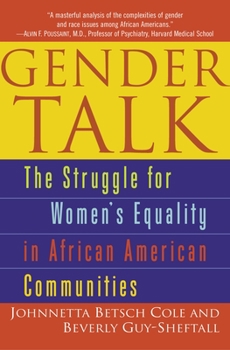Gender Talk: The Struggle for Women's Equality in African American Communities
Select Format
Select Condition 
Book Overview
"A groundbreaking look at the controversial topic of sexism and gender politics within African American communities."-- Ebony In the Black community, rape, violence against women, and sexual harassment are as much the legacy of slavery as is racism. In Gender Talk, Johnnetta Betsch Cole and Beverly Guy-Sheftall argue powerfully that the only way to defeat this legacy is to focus on the intersection of race and gender. Examining why the "race problem" has become so male-centered and how this has opened a deep divide between Black women and men, the authors turn to their own lives, offering intimate accounts of their experiences as daughters, wives, and leaders. They examine pivotal moments in African American history when race and gender issues collided with explosive results. Along the way, they present the testimonies of a large and influential group of Black women and men, including Byllye Avery, Derrick A. Bell, Farai Chideya, Kimberl Crenshaw, Michael Eric Dyson, Marcia Gillespie, bell hooks, and Faye Wattleton. Fearless and eye-opening, Gender Talk is required reading for anyone concerned with the future of African American women--and men.
Format:Paperback
Language:English
ISBN:0345454138
ISBN13:9780345454133
Release Date:December 2003
Publisher:One World
Length:336 Pages
Weight:0.64 lbs.
Dimensions:0.8" x 5.5" x 8.2"
Customer Reviews
2 ratings
good beginning
Published by Thriftbooks.com User , 16 years ago
I agree with the other reviewers but I think it is a step in the right direction....
Black folks, gender matters!
Published by Thriftbooks.com User , 22 years ago
This book is written by two feminist, African-American scholars. Either one or both have connections to Spelman, the nation's only college specifically for black women. In this book, the authors want to show how antiracist struggle could not have been successful without the black women visionaries who played a part in the movement, even if they wouldn't have called their ideas feminist. The chapters cover the authors' biographies, other black scholars talking about how they learned to embrace feminism and gay rights, the either/or bind between civil rights and women's rights, the black church, black silence on intraracial sexual assaults, black gays and lesbians, and rap music.This is a positive text; the authors discuss where they would like to see black activists go, rather than just rehashing old schisms. Further, it recounts history to show that there have always been black feminists and black gay rights activists, thus negating fallacies which say these two groups are white-created by-products. Too often, even in progressive black literature, "race, class, and gender" are deemed of primary importance, but sexual orientation must take a backseat, even if authors are not homophobic. Here, almost every chapter says something about gays and combatting homophobia. I was loving it.This book would make a great contribution for professors trying to put together courses about black feminism or about gay issues in African-American communities. The bibliography of each chapter could basically be a syllabus for many cool courses. Unfortunately, in many ways, the book is just a review of the literature rather than a new analysis of these matters. The chapters remind me both of papers I wrote and papers I read while an undergraduate student. Still, this was an important black feminist book. Sadly, many readers may find Patricia Hill Collins too high-level and bell hooks too repetitive and paranoid, so this book would be a great look into black women's issues for more everyday readers. Regardless, this text was a great addition to studies of intersectionality and womanism (though the latter term is never brought up here).






